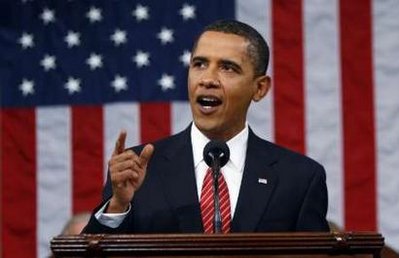Vera, Vera, what has become of you? Does anybody else in here feel the way I do? Well, Rog’, apparently they do. (And, to be she fair, she did say we’d meet again.)
Month: September 2009
Cogburn’s Crossing.
I missed this when it first broke back in March, but it seems the Coens have caught the remake bug, and are re-making True Grit, with Jeff Bridges in the John Wayne role. (No word on who’s playing Kim Darby.)
“Not a traditional remake, the Paramount film will be more faithful to the Charles Portis book than the 1969 pic…while the original film was a showcase for Wayne, the Coens’ version will tell the tale from the girl’s p.o.v.” Interesting…and it pretty much has to pan out better than the Coens’ last remake.
Stuck in the Middle with You.

As I’m sure you know, President Obama delivered his health care reform address to Congress last night. [Transcript.] My thoughts on it are mixed.
On one hand, speaking in terms of rhetoric, style, and delivery, this was an amazing speech, his best since the campaign days. While it’s an open question how long its effects will linger, the address clearly and decisively helped move the reform ball forward. And the emotional closer, featuring Ted Kennedy’s heartfelt final words to the President, was incredibly moving. In sum, it’s the exemplary address we knew Obama had in him on this issue, and he brought it home perfectly.
But, all that being said, I can’t shake the nagging feeling that [a] the policy being outlined last night didn’t quite jibe with the wonderful speech, and, as all too common of late, [b] the president far too readily threw his left flank — the very people who sweat blood and tears to get him elected — under the bus.
To take the second part first, Obama early on indulged in an irritating and textbook case of Beltway false equivalence by setting himself up as the sensible middle between those cuh-rrrrazy single-payer types on the left and the free market fundies on the right. (“There are those on the left who believe that the only way to fix the system is through a single-payer system like Canada’s…“) Uh, yes, and not so long ago, Mr. President, you were among them. I feel like I’ve said this several times recently, but painting the left as dingbats to shore up one’s centrist bona fides is a pretty tired parlor trick at this point, and it never gets any less insulting.
As an aside, on the way into work yesterday, I — and everyone else around the Metro — was accosted by guys in Grim Reaper costumes and bullhorns, telling us all, basically, that violence will erupt and we will all die if this health care bill passes. Y’know, there’s a term for telling people they’ll be killed if a political event happens — We call it terrorism. (As it turns out, there’s a term for wearing a hood while telling people they’ll be killed too.) Well, imagine my surprise to hear — from the president I’ve vocally supported for two years now — that me and my fellow clowns on the left are just as part of the health care problem as these jokers are on the right. I have to admit, it kinda tempers the enthusiasm.
And then there was the discussion of the public option. Yes, the President did make a case for the public option in last night’s remarks: “[A]n additional step we can take to keep insurance companies honest is by making a not-for-profit public option available in the insurance exchange…It would also keep pressure on private insurers to keep their policies affordable and treat their customers better.” In addition, the President correctly pointed out, “It’s worth noting that a strong majority of Americans still favor a public insurance option of the sort I’ve proposed tonight.“
But what the President giveth, the President also taketh away. The public option was clearly brought up in the speech after the non-negotiable section. (“While there remain some significant details to be ironed out, I believe a broad consensus exists for the aspects of the plan I just outlined.“)
Indeed, in case we missed the point, President Obama later made it clear: “To my progressive friends, I would remind you that…[t]he public option is only a means to [an] end – and we should remain open to other ideas that accomplish our ultimate goal.“
He then went on to float two “compromise” ideas that, for all intent and purposes, are public option killers: (1) a trigger and (2) co-ops. (“For example, some have suggested that that the public option go into effect only in those markets where insurance companies are not providing affordable policies. Others propose a co-op or another non-profit entity to administer the plan.“)
The trigger notion — the idea that if the insurance companies don’t fix the problem themselves, a public option would then be “triggered” into existence — is in effect, as one progressive well put it, a threat made with an unloaded gun. It’s kabuki theater, pure and simple, because everyone knows that Congress never pulls the trigger in question. (See also the cost of prescription drugs in Medicare Part D.) As Slate‘s Tim Noah recently ably pointed out, triggers are used all the time as “compromise” fodder, and what they really mean is we’re going to pretend to have addressed the problem and let things go on as they have. And, really, how much worse would insurance companies have to fail before this trigger kicked in? We’re talking about health care reform right now because the system is already broken.
As for co-ops, there’s a good reason they are the compromise that the insurance industry tends to favor. Most likely, they’ll be too small, weak, and scattered to bring real competition to the market.
So, granted, we don’t have a final bill yet, and there are many strong advocates of a public option in the House who will continue to fight for it. But, if the public option is as expendable to the administration as it seemed last night, then we may have some problems.
To wit, if a health care reform bill passes that has an individual mandate (i.e. everyone has to buy insurance), limited subsidies (to keep costs down), and no public option, than what’s basically happening is this: People are being forced to buy insurance they likely still can’t afford from the very private companies that are making vast amounts of coin from the current, broken system. If this sounds like a huge boon for private insurance companies, it is. (One might even start to think they had a hand in writing the legislation.) Yes, a larger risk pool should make health insurance cheaper — but without a public option keeping rates honest, what guarantee do we have that these savings would be passed on to the consumer?
Along those lines, President Obama also made the case last night for a tax on premium plans to help pay for reform. (“This reform will charge insurance companies a fee for their most expensive policies, which will encourage them to provide greater value for the money – an idea which has the support of Democratic and Republican experts.“) But, again, without a robust public option holding the private industry’s feet to the fire, what will stop said insurance companies from just passing these costs down the line, in the form of higher premiums across the board?
(I’ll confess to being confused about this element of the plan anyway. The article I just linked on this premium plan tax says: “The hope is that employers would buy cheaper, less generous coverage for employees, thereby reducing the overuse of medical services.” Uh…cheaper, less generous coverage for employees? That’s a good thing? And I’m by no means an expert on these matters — far from it — but is “the overuse of medical services” really the main problem afflicting our health care system? It sounds a bit to me like “too many notes.”)
All of which is to say that I really hope the substance of the final plan matches the beauty of last night’s rhetoric. Now, I understand the counter-arguments: As Paul Begala recently reminded us, the Social Security Act of 1935 had serious problems too, and look how that turned out. The great is the enemy of the good. Politics is the art of the possible, etc. etc.
I don’t disagree with any of that. But I also believe that leadership is the art of expanding the horizons of the possible. (Cue RFK: “Some men see things as they are and say why. I dream things that never were and say why not.“) We always knew that the President is a master of oratory, and that he would move us all with his eloquence when the time came. But, in setting their sights so low on this bill, the administration, in my view, have come close to squandering both the historical moment and the president’s once-in-a-generation gift.
A historical puzzle lingers over the entire health care reform enterprise at the moment: How is it, with a Democratic House, a filibuster-proof Democratic Senate, and a Democratic president, that the proposal for health care reform on the table basically remains to the right of Richard Nixon? (See also: The Family Assistance Plan.)
Well, the short answer, imho, is lack of meaningful campaign finance and lobbying restrictions. (A key problem that’s about to get a whole lot worse.) But I would also argue in favor of another cause. For decades now, Democrats have tried to find that safe happy moderate middle, while Republicans — flaks, representatives and presidents alike — have willfully and consistently pushed that center to the right. The president’s address, however magnificent and even moving at times, felt like another step in the same old vicious cycle. And at this crucial historical moment, I strongly believe it would be a better demonstration of “our American character” if we Dems — and this administration — showed the courage of our convictions in words and deed.
Republic for Sale.
“If Republicans were wondering how their 2012 presidential candidate is going to compete against President Obama’s $600 million fundraising juggernaut, the Supreme Court seems poised to provide an answer: unlimited corporate spending supporting the Republican candidate, or attacking Obama.” With Justice Sotomayor aboard, the Supreme Court holds a special session today to re-hear arguments in Citizens United v. F.E.C.
And, as Slate‘s Richard Hasen explains, the projected outcome does not look good for McCain-Feingold or advocates of campaign finance reform. “If Roberts or Alito were ready to go the narrow route again in Citizens United, however, there would have been no reason to set the case for reargument explicitly asking the parties to brief the constitutional question, and certainly no reason to rush the case to September so it can be decided before the 2010 election season goes into full swing…Expect the floodgates to open, and the money to flow freely, as early as next year.“
School’s Out, Forever.

So, with that in mind: Yes, Virginia, it is ok for the President of the United States to talk to schoolchildren. In fact, it should probably be considered part of the job. Ask Ronald Reagan. Or George Bush Sr. Or just consider the picture above, taken eight years ago next week.
The Journey is the Reward.

Oscar Gets Preferential Treatment.
“‘Instead of just marking an ‘X’ to indicate which one picture they believe to be the best, members will indicate their second, third and further preferences as well,’ Academy President Tom Sherak said. ‘PricewaterhouseCoopers will then be able to establish the Best Picture recipient with the strongest support of a majority of our electorate.“
Along with their recently-announced move to ten Best Picture nominees, the Academy of Motion Picture Arts and Sciences moves back to a preferential voting system. “The system has long been used in the round of voting which determines the nominees in most categories, but it has not been used on the final ballot for Best Picture since 1945.“
“Courageous” Friendly Fire.
“‘We have been saying all along that the most important part of this debate is not the public option, but rather ensuring choice and competition,’ an aide said. ‘There are lots of different ways to get there.‘” Granted it’s in Politico, which always needs to be taken with a grain of salt, but Team Obama is apparently floating another no-public-option trial balloon. “On health care, Obama’s willingness to forgo the public option is sure to anger his party’s liberal base. But some administration officials welcome a showdown with liberal lawmakers if they argue they would rather have no health care law than an incremental one. The confrontation would allow Obama to show he is willing to stare down his own party to get things done.“
Hmmm. “Getting tough” with the Left (while having Democratic majorities in both Houses of Congress) to impress people on the Right who can’t stand you and want you to fail.That doesn’t sound like change we can believe in either, and it’s going to turn off the people who got this president elected in droves. I fear the Third Way/DLC careerist cadre in and around the administration are blowing a historic opportunity here.
Update: “‘It’s so important to get a deal,’ a White House official said, speaking on the condition of anonymity in order to be candid about strategy. ‘He will do almost anything it takes to get one.’” Sigh…I know I’m not a master tactician or anything, but, as with dropping single-payer right away, I would think telegraphing “we’re really really desperate” before coming to the table is not a very good negotiating strategy.
Symptoms of a Diseased Punditry.
More recent signs of the freefall of journalistic integrity in the Beltway:
* Marc Ambinder, a thoroughly lousy blogging “journalist” in the Atlantic stable, chalks up prescient criticism of the Bush administration’s gaming of security alerts as solely the result of liberal fringe-hippy “gut hatred.” Says Ambinder in a burst of CYA blather: “Information asymmetry is always going to exist, and, living as we do in a Democratic system, most journalists are going to give the government the benefit of some doubt, even having learned lessons about giving the government that benefit.” Way to speak truth to power, Marc. In other words, suck-up, spit-down, and let’s not let the facts — or god forbid, any attempted acts of daily journalism — get in the way of our obsequious administration boot-licking.
FWIW, after getting roundly slammed for this ridiculous understanding of what constitutes journalism, Ambinder walked back his comments…some. (It hasn’t caused him to deviate from his usual m.o., however, which is acting as stenographer to people in power and parsing the day’s news to find that exact comfortable midpoint where the CW resides. And sadly,he’s not even the worst blogger over at the Atlantic — that would be the former Jane Galt, Megan McArdle.)
* TIME’s Joe Klein has been on a bit of a losing streak lately. Ostensibly a “liberal” — at least the Village’s town crier, Howard Kurtz, considers him one — Klein is, like Ambinder and so many other of his ostensibly lefty pundit colleagues — really just an establishmentarian. He rolls over for the powerful and spends most of his copy and television appearances simply honing his “I’m a lefty, but I’m one of the sane ones” schtick. Take any given issue, look over Klein’s output, and you’ll usually find him, a la Howard Fineman, staking out that comfortable middle where roadkill dies and TV pundits thrive. (Most recent case in point: health care reform, where’s he’s for…something…but lately could really take or leave that goofy public option.)
Anyway, Klein recently made the mistake of mouthing off about those crazy lefties, and particularly Glenn Greenwald — whom he weirdly deems a “civil liberties absolutist” — in front of a very able blogger (and in a bit of grand historical irony, the granddaughter of I.F. Stone), who cut him short in hilarious fashion. Klein then took his anti-Greenwald crusade to Journolist, where his angry screeds and troubles with facts didn’t seem particularly well-received either.
So, now Klein has taken to ranting on Swampland about his recent troubles. Arguing that Greenwald indulges in “intemperate attacks in which he questions the character of — no, it’s worse than that: he slimes — anyone who has the temerity to disagree with him,” Klein also deems Aimai, the aforementioned partygoer/blogger, a “rather pathetic woman acolyte of Greenwald” — a bit intemperate, don’tcha think? As for Greenwald himself, Klein considers him “thoroughly dishonorable,” as well as — I kid you not — insufficiently pro-military. “I have never seen him write a positive sentence about the US military,” Klein declaims, a paragraph or so before he admits that “I am not a religious reader of Greenwald.”
Now, putting aside whether Klein’s blatant and bizarre Cheneyism is true — it isn’t — as well as Klein’s self-evident buffoonery here, how would penning enthusiastic copy about the US armed forces be in any way a reasonable evaluator of journalistic integrity? It’s like these pundits have so talked themselves into ignoring the grotesquely under-reported Pentagon pundit scandal that they’re starting to believe their own talking points. Screaming “You don’t love the troops!!” is a naked and craven attempt at ad hominem obfuscation pretty much every time a politician engages in it. But coming from the pen of a journalist, and a purported “lefty” one at that, it’s just plain ridiculous.
(By the way, Greenwald’s own thoughts on this are here, although the Swampland commenters do just as solid a job of eviscerating Klein for this disastrous posting. As does Aimai the Acolyte, who in her response gets in this certifiable zinger: “He’s not a public intellectual — he’s a f**king wind sock. And he knows it.“)
* Moving to another purported lefty of the establishment press, calling out the WP‘s Richard Cohen for dim reasoning and faulty logic these days is like calling the sky blue — it’s just the way it is. Nevertheless, his piece on torture today was particularly vile, and it’s a textbook case of two standard operating Beltway-pundit presumptions, also witnessed in the cases of Ambinder and Klein: [1] Establishment journalists are exceedingly special people, and [2] the height of wisdom is always to be found in the exact middle-of-the-road.
To take point one first, Cohen frets about Attorney General Holder’s new weaksauce-as-intended inquiry into CIA torture because of the outrageous and despicable violations of civil liberties committed upon…Judith Miller. He writes: “Special prosecutors are often themselves like interrogators — they don’t know when to stop. They go on and on because, well, they can go on and on. One of them managed to put Judith Miller of The New York Times in jail — a wee bit of torture right there.” Uh, no.
A few years after getting absolutely played by the powers-that-be and reporting lies about the existence of WMD in Iraq in the paper of record, NYT reporter Judith Miller spent three months in a comparatively nice prison cell because she refused to testify in the Plame investigation about one of those very same powerful people, Scooter Libby. Now, however you feel about what happened with Ms. Miller, she was not tortured. She was not waterboarded dozens or hundreds of times. She was not tortured for refusing to assert a false positive. She was never given the Room 101 treatment. And she did not die in our custody. So that truly bizarre analogy breaks down pretty quickly.
Even more irritating, however, is the hemming-and-hawing, “pox on both your houses” attempt at moderation Cohen tries to employ through the rest of this piece. “This business of what constitutes torture is a complicated matter. It is further complicated by questions about its efficacy: Does it sometimes work? Does it never work? Is it always immoral? What about torture that saves lives? What if it saves many lives? What if one of those lives is your child’s?” Cohen asks these questions as if they’re unanswerable profundities…or as if all of the considerable data showing torture is completely ineffective does not exist.
Then he plays the 24 game: “Ah yes, the interrogator must build rapport with the captured terrorist. That might work, but it would take time. It could take a lot of time.” Again, Cohen ignores the fact that the ticking-time-bomb scenario is a comic book fantasy with absolutely no application to the real world.
And he saves his worst for last: Torture, Cohen writes, “cannot be the subject of an ideological tug of war, both sides taking extreme and illogical positions — torture never works, torture always works, torture is always immoral, torture is moral if it saves lives. Torture always is ugly. So, though, is the hole in the ground where the World Trade Center once stood. ” Did you catch that? Before Cohen took us to commercial with a resounding chorus of 9/11, 9/11, 9/11, he deemed that “torture never works” and “torture is always immoral” are now “extreme and illogical positions,” right on a par with “torture always works.” Say what?
It is exactly these types of false equivalencies, usually fostered by columnists these days to CYA and prostrate before power, that is killing what’s left of journalistic integrity in the Beltway. For some reason or another — most likely so as not to lose their privileged place of influence in the hive — “journalists” like Ambinder, Klein, and Cohen seem to think it’s their job finding, and then reporting from, the safe, non-threatening and perfectly vanilla midpoint between opposing political sides. The whole “holding up claims to independent, verifiable facts” aspect of journalism is a completely lost art among far too many of today’s pundit class. It gets in the way of their lazy sense of entitlement, I guess, and I’m sure it really cuts back on the talking out of one’s ass on TV for a living.
Put another way, it’s Paul Begala’s “Neil Armstrong principle all over again: “If John McCain and Sarah Palin were to say the moon was made of green cheese, we can be certain that Barack Obama and Joe Biden would pounce on it, and point out it’s actually made of rock. And you just know the headline in the paper the next day would read: ‘CANDIDATES CLASH ON LUNAR LANDSCAPE.’“
For all of Ambinder, Klein, and Cohen’s many faults, the problem with establishment journalism today is bigger than any of them — they’re just useful case studies in a diseased system. The values ostensibly undergirding the punditocracy — speak truth to power; check your sources, resort to facts; have some clue what you’re talking about — have been corrupted, and the whole rotten enterprise is now in an advanced state of decay. (For yet another example, see MSNBC’s Chuck Todd, who — as soon as he moved up a few pegs in the Beltway regime — started laughing off torture investigations as cable news “catnip.”)
This long post may just read like sarcastic score-settling, but this is no small matter. The desiccated values and m.o. of today’s Beltway pundit class are helping to kill off health care reform. They’re helping Dubya-era criminals get away with torture. And they’re going to derail any meaningful attempts at systemic political reform in the future…unless we start holding their feet to the fire. A republic needs no courtiers — it damn well needs good journalists.
The story of our journalistic establishment over the past thirty years is basically Bob Woodward, writ large: Beltway journalists and pundits used to challenge the politicians in power and serve as the public’s vital and necessary watchdogs. Now, like any old mutt, far too many just want to sit next to the masters, bark at those who would deign to threaten them, and try to get rewarded for their servility with an occasional scratch behind the ears. This will not do.
An Affirming Flame.
“All I have is a voice to undo the folded lie, the romantic lie in the brain of the sensual man-in-the-street and the lie of Authority, whose buildings grope the sky: There is no such thing as the State, and no one exists alone; Hunger allows no choice to the citizen or the police. We must love one another or die.” W.H. Auden‘s “September 1, 1939” turns 70.
Via BDL, and seen where “ironic points of light flash out wherever the Just exchange their messages,” a.k.a. Twitter.



